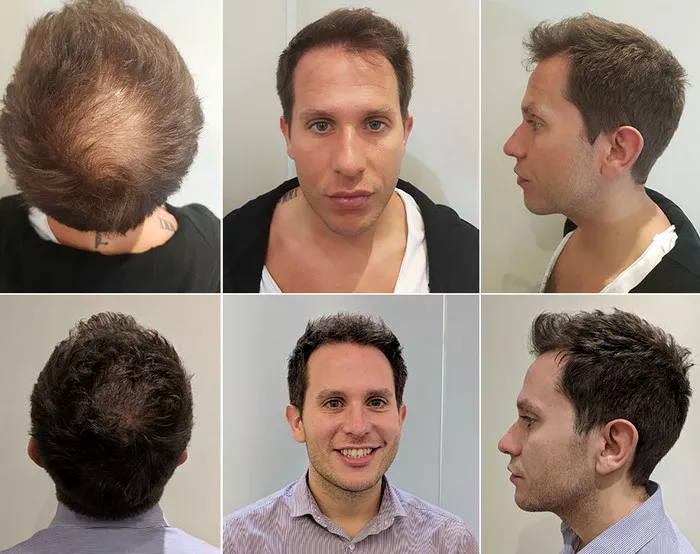Undergoing a hair transplant is a significant decision aimed at restoring natural hair growth and enhancing your overall appearance. After the procedure, many individuals are eager to see quick and successful results. While patience is crucial in the post-transplant phase, there are strategies you can employ to promote faster and healthier hair growth. In this article, we’ll explore key steps and considerations for nurturing your new hair growth after a transplant.
1. Follow Post-Transplant Care Instructions
Post-transplant care is crucial for the success of the procedure and the subsequent growth of your new hair. Your surgeon will provide specific instructions on how to care for your transplanted area, including guidelines for washing, avoiding direct sun exposure, and refraining from strenuous activities. Adhering to these instructions ensures a proper healing process, which is essential for successful hair growth.
2. Maintain a Healthy Scalp
A healthy scalp is the foundation for robust hair growth. Keep the scalp clean and free from infections by following your surgeon’s recommendations for gentle cleansing. Use a mild, sulfate-free shampoo, and avoid scratching or picking at the transplanted area. Maintaining a healthy scalp environment is critical for the proper nourishment of hair follicles.
3. Balanced Diet for Nutrient Support
A well-balanced and nutrient-rich diet is instrumental in promoting hair growth. Include foods rich in vitamins, minerals, and proteins that support overall health and nourish hair follicles. Foods high in biotin, vitamin E, iron, and omega-3 fatty acids are particularly beneficial for hair health. Consult with a nutritionist to ensure you’re getting the right nutrients to support your new hair growth.
4. Stay Hydrated
Proper hydration is essential for overall health and can positively impact hair growth. Drinking an adequate amount of water helps maintain the moisture balance in your scalp and promotes a healthy environment for hair follicles. Aim to drink at least eight glasses of water a day to support optimal hydration.
5. Incorporate Hair Growth Supplements
Supplements can complement your diet and provide additional support for hair growth. Biotin supplements are commonly associated with promoting hair health, but other supplements like vitamins A, C, and D, as well as zinc and iron, can also contribute to optimal hair growth. Consult with your healthcare provider before incorporating any supplements into your routine to ensure they are safe and suitable for you.
6. Avoid Smoking and Excessive Alcohol Consumption
Smoking and excessive alcohol consumption can negatively impact blood circulation, which is crucial for delivering nutrients to hair follicles. These habits may hinder the success of your hair transplant and slow down the growth of new hair. Quitting smoking and moderating alcohol intake can contribute to better overall health and support optimal hair growth.
7. Regular Scalp Massages
Scalp massages stimulate blood flow to the hair follicles, promoting nutrient delivery and encouraging hair growth. Gently massage the transplanted area using your fingertips in circular motions. This simple practice can contribute to a healthier scalp and expedite the growth of your new hair.
8. Low-Level Laser Therapy (LLLT)
Low-level laser therapy is a non-invasive treatment that has shown promise in promoting hair growth. LLLT devices, such as laser caps or helmets, use low-level lasers or light-emitting diodes to stimulate hair follicles. While research on the efficacy of LLLT is ongoing, some individuals incorporate it into their post-transplant care routine to potentially accelerate hair growth.
9. Use Hair Growth Shampoos and Topicals
Hair growth shampoos and topicals containing active ingredients like minoxidil or ketoconazole may be recommended by your surgeon or dermatologist. These products can help stimulate hair follicles and promote a conducive environment for new hair growth. Follow the instructions provided and use them as part of your regular hair care routine.
10. Manage Stress Levels
Chronic stress can have adverse effects on overall health, including the health of your hair. High-stress levels may contribute to hair loss, slowing down the growth of your new hair. Incorporate stress-management techniques such as meditation, yoga, or deep breathing exercises into your routine to support optimal well-being.
11. Protect Your Scalp from the Sun
Direct sun exposure can be harmful, especially in the early stages of post-transplant recovery. UV rays can damage the delicate skin of the scalp and potentially affect the success of the transplant. Use a hat or scarf to protect your scalp when outdoors, and apply a broad-spectrum sunscreen with a high SPF to shield the transplanted area.
12. Schedule Follow-Up Visits
Regular follow-up visits with your surgeon are essential to monitor the progress of your hair growth and address any concerns or questions you may have. Your surgeon may make adjustments to your post-transplant care routine based on the observed progress. Open communication and collaboration with your medical team are crucial for the success of your hair transplant.
See Also: The Truth About Hurt in Hair Transplants Surgery: A Full Guide
Conclusion
Accelerating hair growth after a transplant involves a combination of proper care, a nutrient-rich diet, and lifestyle choices that support overall health. By following post-transplant care instructions, maintaining a healthy scalp, adopting a balanced diet, staying hydrated, incorporating supplements, avoiding detrimental habits, practicing scalp massages, considering low-level laser therapy, using recommended shampoos and topicals, managing stress levels, protecting your scalp from the sun, and scheduling regular follow-up visits, you can optimize the success of your hair transplant and foster robust, healthy hair growth. Patience remains a virtue in the process, but these proactive steps contribute to the best possible outcome for your new hair.


